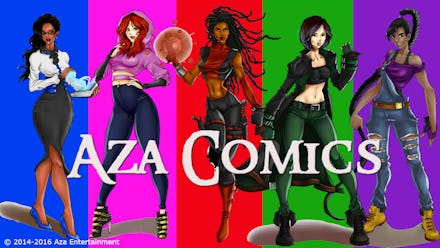Author Jazmin Truesdale Has an Answer to Very White, Male Comic Books: Making Her Own

Jazmin Truesdale is a self-professed fan of superheroes. As a child, she pored through comic books reading their stories — even though, she noted, the heroes within rarely reflected who she was.
This took its toll as she grew older. As she told the Huffington Post, the "racism and sexism" in what she was reading threatened to turn her away from comics. But then her sister found Wonder Woman.
"She's 6 and recently discovered Wonder Woman," Truesdale said via email. "But I realized the comics weren't appropriate for her age, nor were there very many heroes of color to inspire her. I saw how she obsessed over Wonder Woman, and thought about how much more it would impact her if she saw a character equally as powerful who looked like her."
For Truesdale, ignoring comics' representation issues was no longer an option — so she took matters into her own hands.
A North Carolinian by birth, Truesdale is the founder of Aza Comics, a brand devoted to producing comics featuring female superheroes — many of them women of color. She took inspiration from real-life figures like Janet Jackson and Nicki Minaj, the latter of whom inspired a lesbian hero named Genie; she also looked to female African warriors for insight.
Kala, the leader of Aza Comics' team of heroines, was inspired by the warriors of Dahomey. Kala is joined by Genie and several other superheroines — like Adanna, "The Mechanic," and Nari, the "Twin Oracle" — each with her own diverse background and skill set.
When designing the heroines of Aza Comics alongside illustrator Remero Colston, Truesdale didn't just create what she wanted to see — she asked other women, too.
"For so long entertainment has been made for us without taking into consideration what we, as women, want," she explained. "Women merely want a choice and a voice — the ability to make decisions about our own lives. And in a time when even politicians are trying to take that away from us, I felt like I could at least give women a voice in this."
The women that Truesdale surveyed indicated they wanted Aza Comics to avoid preachiness (fewer monologues about equality, more storylines actually depicting equality) and deeply original characters. They wanted something beyond Supergirl, whose creation complemented to the already existing Superman — the women wanted characters who stood on their own.
Truesdale's comics are an alternative antidote to an exclusive comic book world and whitewashed cinematic universes. But the author hopes change will come to the big leagues, too.
"I would like to see better development and visibility of female characters, particularly women of color," she said. "I would love to be able to ask my little sister, 'What movie do you want to see tonight, Storm or Wonder Woman?'"
As has been pointed out ad nauseum, inclusion sells. Diversity is more than just a way for audiences to feel represented — it's what the audience demands. "As a society, we have become more knowledgeable and socially conscious, and it shows in what we choose to watch," Truesdale noted. "If you want your entertainment to sell, you have to create characters that people can identify with. That means creating entertainment that more accurately reflects our society."
It's a lesson the author has taken to heart — and one far bigger entertainment empires could learn from her efforts.
Read more: